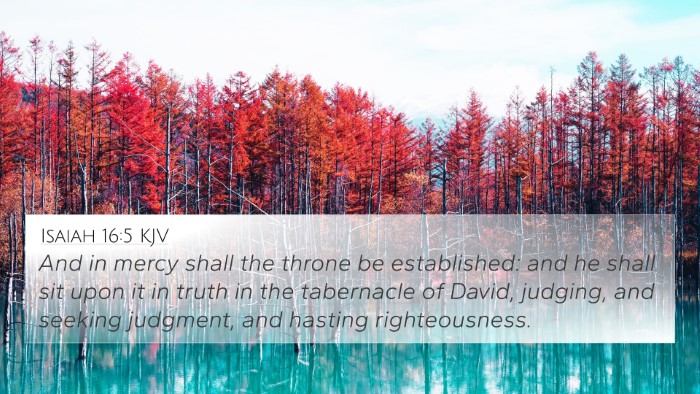Understanding Proverbs 20:28
Bible Verse: Proverbs 20:28
"Mercy and truth preserve the king: and his throne is upheld by mercy."
Summary of Insights
Proverbs 20:28 highlights the importance of mercy and truth in the leadership of a king. The verse suggests that a ruler's reign is sustained through these vital virtues, emphasizing that divine principles should guide authority. Here is a detailed analysis of the verse, drawing connections between biblical texts and the significance of its themes.
Exploration of Key Themes
-
Mercy:
Mercy in this context refers to compassion and forgiveness, which are essential for a just and righteous rule. Matthew Henry elaborates that mercy not only enriches a ruler's character but also influences how subjects respond. It creates an atmosphere of trust and loyalty.
-
Truth:
Truth signifies sincerity and faithfulness in governance. Albert Barnes notes that a king who upholds truth ensures that justice prevails in his kingdom, reflecting God's ordered nature.
-
Preservation of Authority:
The preservation of the king’s throne indicates that his rule's stability relies on moral and ethical conduct. Adam Clarke interprets this as a divine design where leadership is upheld through adherence to truth and mercy.
Bible Cross References
Proverbs 20:28 can be cross-referenced with several scriptures that highlight its themes:
- Proverbs 16:12: "It is an abomination to kings to commit wickedness: for the throne is established by righteousness."
- Psalms 101:1-2: "I will sing of mercy and judgment: unto thee, O LORD, will I sing. I will behave myself wisely in a perfect way..."
- Micah 6:8: "He hath shewed thee, O man, what is good; and what doth the LORD require of thee, but to do justly, and to love mercy, and to walk humbly with thy God?"
- Proverbs 29:14: "The king that faithfully judgeth the poor, his throne shall be established for ever."
- James 2:13: "For he shall have judgment without mercy, that hath shewed no mercy; and mercy rejoiceth against judgment."
- Matthew 5:7: "Blessed are the merciful: for they shall obtain mercy."
- Lamentations 3:22-23: "It is of the LORD's mercies that we are not consumed, because his compassions fail not. They are new every morning: great is thy faithfulness."
Thematic Connections and Analysis
This verse connects thematically to the nature of leadership found throughout the Bible. The virtues of mercy and truth are not isolated; they resonate with various passages that underscore the need for righteous governance.
Connections Between Bible Verses
The links between these verses demonstrate a comprehensive biblical paradigm regarding authority. For example, the verses in Proverbs affirm that righteousness is linked to the success of a nation's rule, while James reminds us of the reciprocal nature of mercy.
Inter-Biblical Dialogue
By studying Proverbs 20:28 in conjunction with these cross-references, we can observe the ongoing dialogue within Scripture that emphasizes character traits critical to leadership. The inclusion of mercy alongside truth suggests a holistic approach wherein leaders must balance compassion with integrity.
Tools for Bible Cross-Referencing
When conducting a cross-reference Bible study, various tools can facilitate a deeper understanding:
- Bible concordances provide insights into key terms and their occurrences.
- Cross-reference guides help identify related themes across different books.
- Comprehensive Bible reference resources offer additional context, enhancing cross-referencing methods.
- How to find cross-references in the Bible will enable users to uncover connections that may not be immediately apparent.
Conclusion
The moral principles presented in Proverbs 20:28 resonate through various biblical narratives, underscoring the need for mercy and truth within leadership. This theme not only enriches our understanding of scriptural authority but also remains vital for the application in contemporary governance. By engaging in comparative Bible verse analysis, believers can appreciate the careful interconnections between God's expectations for rulers and the broader implications this has on society.










